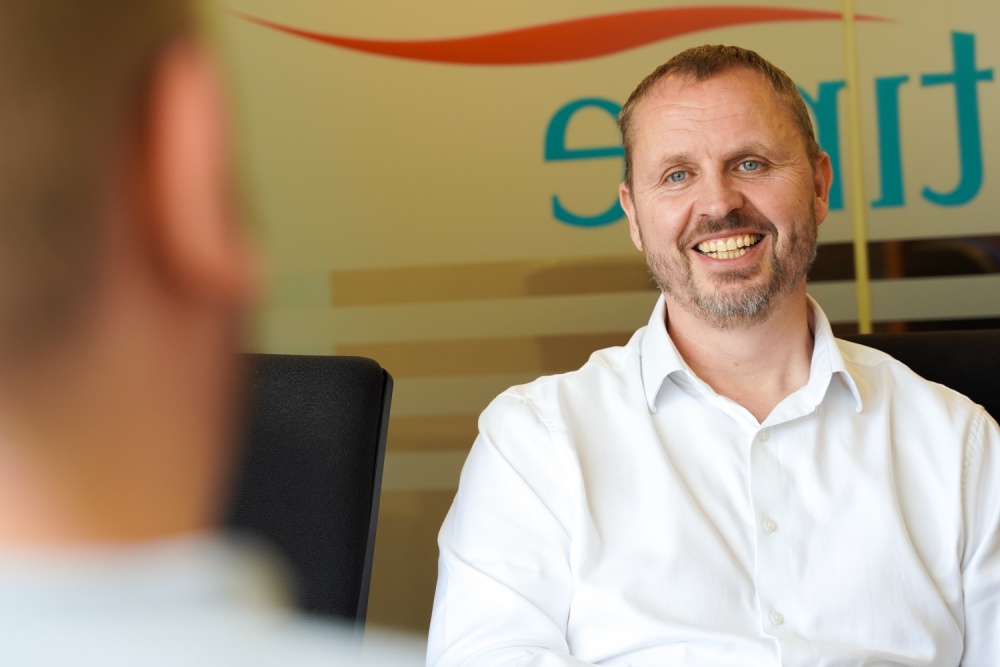Meet Andy Wealthall, Chief Operating Officer at Lifetime and financial wellbeing superhero
July 31, 2024

Andy Wealthall is Chief Operations Officer at Lifetime. With a mission to support and empower people in achieving their financial goals, Andy and the whole Lifetime team are on target to transform the landscape of financial wellbeing.
So, this month, Victoria Hicks counted herself very lucky to meet Andy and find out more about his story, and what the future of financial planning could look like, thanks to advancing technology.
Can you tell the readers a bit about your own personal background, and the inspiration behind the “new” Lifetime? What challenge in financial planning did you aim to address?
For more than two decades, I dedicated my career to the travel industry, helping people escape their everyday lives for a few precious weeks each year. While this was incredibly rewarding, I couldn’t shake the feeling that I was only addressing a small part of people’s lives.
What about the other 51 weeks of the year? What about the financial challenges that impact people every day, not just during their holidays?
Growing up, I never had access to the kind of financial services that could have made a real difference in my life. I saw firsthand how limited financial opportunities can hold people back. It was a frustration that stayed with me.
When I met the CEO of Lifetime, I realised I had found a mission.
It was an opportunity to create a financial services platform that was truly accessible to everyone, regardless of their age, income, or background. We wanted to challenge the status quo and break down the barriers that prevent people from achieving their financial goals.
Lifetime isn’t just about providing financial advice; it’s about empowering individuals to take control of their financial futures. We believe that everyone deserves access to expert guidance and support, not just a simplified, automated solution.
Our goal is to create a societal shift where financial wellbeing is attainable for all.
By offering comprehensive financial planning services to everyone, we hope to make a lasting impact on people’s lives. It’s about more than just numbers; it’s about building trust, providing education, and helping people achieve their dreams.
What were some of the biggest obstacles you faced in the early stages of launching an AI-enabled proposition?
Launching a proposition that leverages technology, including AI where appropriate, presented a unique set of challenges.
A primary hurdle was altering the mindset within the industry. Convincing traditional financial professionals of the value of technology and its ability to enhance, rather than replace, human expertise was essential.
Another key challenge was optimising technology’s role. It was crucial to identify the specific areas where technology could add value and streamline processes without compromising the human element.
Striking the right balance between automation and human interaction was key to delivering a superior customer experience.
Despite facing scepticism about the potential of technology, we remained steadfast in our belief in its ability to improve financial services.
By focusing on practical applications and measurable outcomes, we were able to overcome resistance and demonstrate the tangible benefits of our approach.
Your firm has made financial guidance, support, and advice accessible to a broader audience. How have you seen this impact individuals and communities that were previously underserved?
By democratising access to financial guidance, support, and advice, we have witnessed a profound impact on individuals and communities that have been traditionally underserved.
A cornerstone of this effect has been instilling confidence in people to engage in financial planning in a way that aligns with their unique circumstances. This newfound confidence has led to reduced stress and improved overall wellbeing.
Countless individuals have shared how our services have enabled them to sleep better at night, free from financial worries.
For example, we supported a woman navigating a divorce who lacked the financial resources to engage a traditional financial adviser. Through our platform, she gained the tools and confidence to make informed decisions during a challenging life change.
Beyond individual impact, our services have transformed the lives of employees within the companies we serve. By providing accessible financial support as an employee wellbeing benefit, we have empowered people to focus on their work and personal goals, leading to increased job satisfaction and overall company performance.
Ultimately, we believe that financial wellbeing is a fundamental building block for a stronger society. By making our services accessible to all, we are contributing to a more equitable and prosperous future.
How does your AI technology work in conjunction with traditional financial planning methods? How do you find this enhances the process for clients?
Our AI technology is designed to enhance, not replace, the role of human financial planners. We believe in harnessing the power of technology to streamline processes and improve the overall client experience.
A key focus is on efficiency and simplicity. By automating tasks like data analysis and report generation, we free up financial planners to spend more time providing personalised advice.
For example, AI can generate a clear, concise summary of a client’s financial situation, including their progress towards goals. To make this information even more accessible, we utilise AI-powered virtual avatars to deliver these updates in an engaging video format. Clients can watch these videos at their convenience, gaining a clear understanding of their financial health and preparing for their next advisor meeting.
This approach empowers clients to take a more active role in managing their finances.
By providing easily digestible information, we encourage informed discussions between clients and their advisers. Ultimately, our goal is to create a more efficient, transparent, and satisfying financial planning experience for everyone.
The positive feedback we’ve received confirms that our approach is resonating with clients.
Building trust is crucial in the finance industry. How have you managed to gain the trust of your clients using an AI-enabled process?
Building trust in the financial industry is paramount, and integrating AI has required a thoughtful and transparent approach. At the core of our strategy is a steadfast commitment to putting clients at the heart of everything we do.
We’ve prioritised transparency by clearly communicating how AI is used and the benefits it brings. Our clients understand that AI is a tool to enhance their financial journey, not replace human expertise.
We’ve also invested heavily in data security and privacy, ensuring that client information is always protected.
Crucially, we’ve maintained a strong focus on the human element.
Our AI-driven insights are always complemented by the expertise of our financial advisers. This hybrid approach provides clients with the reassurance of human guidance combined with the efficiency and accuracy of technology. By demonstrating that AI is working in their best interests, we’ve fostered a culture of trust and confidence.
What has been the most significant achievement your firm has completed so far? Is there a specific success story that stands out to you?
Our most significant achievement to date has been addressing the advice gap.
This is a global issue, and we believe we’ve developed a solution that can make a profound impact on countless lives. By making financial guidance accessible to everyone, regardless of their financial situation, we’ve taken a significant step towards creating a more financially secure society.
Our focus now is to ensure that this solution reaches as many people as possible.
We want to make Lifetime a household name and demonstrate the effect of our transformative services to individuals, communities, and economies worldwide.
Looking ahead, are there any exciting developments coming from the AI space that could further revolutionise financial planning?
The AI landscape is evolving rapidly, presenting exciting opportunities to revolutionise financial planning.
While there’s immense potential, it’s crucial to approach new developments with discernment; the market is saturated with claims of AI breakthroughs, but not all solutions deliver on their promises.
We’re particularly excited about AI’s ability to identify potential vulnerabilities in financial plans.
Imagine a system that proactively pinpoints areas of risk, allowing advisers to address them before they become significant issues. This is just one example of how AI can enhance the adviser-client relationship.
The financial planning industry is undergoing a transformative shift. What once seemed like distant future possibilities is becoming reality at an accelerated pace.
To thrive in this dynamic environment, businesses must embrace innovation and stay ahead of the curve.
What advice would you give to other entrepreneurs looking to innovate in the financial sector, especially those considering the integration of AI technology?
My advice to entrepreneurs seeking to innovate in the financial sector is to embrace a culture of curiosity and collaboration. Engage with industry peers, ask challenging questions, and be sceptical of overhyped claims.
At Lifetime, we’ve found immense value in sharing knowledge and experiences with other firms. By working together, we can collectively address the complex challenges facing the industry and better serve underserved populations.
We believe in the power of collaboration and have actively shared some of our services with other companies to help them thrive and grow. There’s no need to work in silos; strong partnerships can benefit everyone involved.
Remember, the ultimate goal is to create solutions that genuinely improve people’s financial lives.
What do you think is the biggest risk to traditional firms who do not adopt new technologies?
The most significant risk facing traditional firms that resist adopting new technologies is irrelevance.
While regulatory compliance is essential, a singular focus on meeting regulatory requirements can be a distraction from the core priority: client needs.
Consumers expect innovation and efficiency across all sectors. Financial services is no exception.
By prioritising client experience and delivering cutting-edge solutions, firms can not only meet regulatory standards, but also exceed client expectations.
History is replete with examples of businesses that failed to adapt to change. The financial services industry is not immune to this fate.
To survive and thrive, firms must embrace innovation and technology. It’s not just about keeping up; it’s about leading the way.
Get in touch
If you’d like to learn more about Lifetime, download the app, email communicationsdept@lifetime-fm.com, or call 01226 208600 for a chat.
To find out Melo’s vision of technology and the role it plays in the value of your business, email hello@melo.co.uk, or call 0113 4656111.

We're your
navigators!
Say 'elo
We’ve got our thinking caps on and we’re ready to mingle.